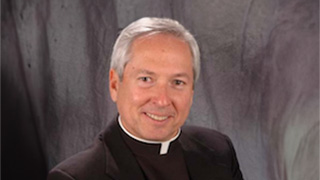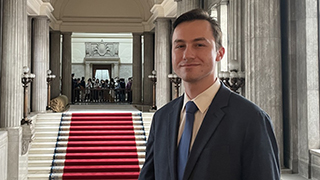ICSST Professor Emeritus Reflects, in International Press, on Dignity of Human Beings
Tuesday, July 9, 2024

Rev. Msgr. Thomas G. Guarino, S.T.D.
Reverend Monsignor Thomas G. Guarino, S.T.D., professor emeritus of systematic theology of Immaculate Conception Seminary School of Theology (ICSST), shared his insights on Vatican II and Dignitas Infinita with readers of the widely acclaimed First Things ecumenical journal, in a column also syndicated globally through the ZENIT Catholic News Service.
In his article, Monsignor Guarino explores how Dignitas Infinita (DI), the recent declaration by the Dicastery for the Doctrine of the Faith, cites both ancient and modern philosophers from both inside and outside the Church, including Cicero, Boethius, Aquinas, Levinas, Rosmini, Newman, and Maritain. The piece provides an in-depth examination, and reviews Vatican II debates over religious liberty that produced Dignitatis Humanae and how these documents provide a deeper influence than is visible on the surface.
"DI argues that, at the most foundational level, the dignity of human beings is derived from the indelible image of God imprinted on every human being. Every other conclusion in the text flows from this biblical premise," explains Guarino, noting that "This logic—that human dignity is rooted in man’s analogical relationship to God—was also central to the heated debates on religious freedom that took place at Vatican II and resulted in Dignitatis Humanae. As the title indicates, "dignity" was a salient motif of the conciliar statement. And although no one argued against human dignity at Vatican II, the conclusions drawn from it were the subject of intense controversy—a debate not entirely extinguished even in our own day, almost sixty years later."
Guarino illustrates his points with numerous examples of the gradual development of the idea of human dignity in Christian thought throughout the 1960s and quotes from the famous 2005 Christmas speech of Benedict XVI [which] stated that Vatican II represented "continuity and discontinuity on different levels."
"Catholic theology was and is fully capable of handling these kinds of discontinuities, as I have argued elsewhere. In De Libertate there was discontinuity with the earlier tradition: The assertion that human dignity entailed the objective right to religious liberty had not been championed by popes in the nineteenth century. But there was also clear continuity," Guarino explains. "For example, Vatican II strongly defended Christian and Catholic exceptionalism. And as De Smedt rightly insisted, the dignity of the human person had been increasingly crucial to the papal magisterium. In this sense, Dignitatis Humanae was the result of organic development over time."
In conclusion, Guarino writes "What is new in Dignitatis Humanae justifies the comment made by Henri De Lubac in his conciliar journal: Some theologians had hoped that Vatican II would simply consecrate magisterial teaching of the past hundred years and ‘correct not even a word of this,' " noting "On the contrary, he insisted, the council’s task was to search the Scriptures and the Fathers, bringing to bear the Church’s entire tradition, East and West, on the challenges facing the Christian faith in the twentieth century."
About ICSST
Immaculate Conception Seminary is a House of Formation for the Roman Catholic priesthood and the School of Theology of Seton Hall University. Forming priests for God’s people has remained the Seminary’s constant focus, and the Seminary faculty—well-educated authors and scholars in their own fields—devote their time and energy to preparing these men for priesthood amidst the challenges of the 21st century. The School also focuses on the theological education of lay men and women, permanent deacons and candidates for the permanent diaconate, religious who are not studying for ordination, and already-ordained priests—providing not only for their academic formation but also for their personal, pastoral and spiritual formation.
To read the full article, visit First Things: Vatican II and Dignitas Infinita and ZENIT: Vatican II and Dignitas Infinita, the last statement of the Doctrine of the Faith.
Categories: Faith and Service






